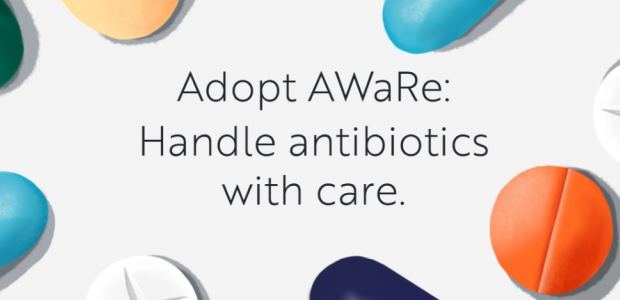
WHO Launches Antimicrobial Resistance Campaign
"Antimicrobial resistance is an invisible pandemic," said Dr. Mariângela Simão, WHO's assistant-director general for Access to Medicines. "We are already starting to see signs of a post-antibiotic era, with the emergence of infections that are untreatable by all classes of antibiotics. We must safeguard these precious last-line antibiotics to ensure we can still treat and prevent serious infections."
The World Health Organization on June 19 is launching a global campaign that urges governments to adopt a tool to reduce the spread of antimicrobial resistance, adverse events, and costs. The AWaRe tool was developed by the WHO Essential Medicines List to contain rising resistance and make antibiotic use safer and more effective; it classifies antibiotics into three groups – Access, Watch, and Reserve – and specifies which antibiotics to use for the most common and serious infections, which ones should be available at all times, and those that must be used sparingly or preserved and used only as a last resort.
WHO reported that the campaign aims to increase the proportion of global consumption of antibiotics in the Access group to at least 60 percent and to reduce use of the antibiotics most at risk of resistance from the Watch and Reserve groups. Using Access antibiotics lowers the risk of resistance because they are "narrow-spectrum" antibiotics (targeting a specific microorganism rather than several) and less expensive because they are available in generic formulations.
"Antimicrobial resistance is one of the most urgent health risks of our time and threatens to undo a century of medical progress," said Dr. Tedros Adhanom Ghebreyesus, WHO's director-general. "All countries must strike a balance between ensuring access to life-saving antibiotics and slowing drug resistance by reserving the use of some antibiotics for the hardest-to-treat infections. I urge countries to adopt AWaRe, which is a valuable and practical tool for doing just that."
Antimicrobial resistance is a global threat that continues to rise globally, as highlighted in a recent report by the International Coordination Group on Antimicrobial Resistance. According to WHO, currently it is estimated that more than 50 percent of antibiotics in many countries are used inappropriately, such as for treatment of viruses when they only treat bacterial infections or use of the wrong (broader-spectrum) antibiotic, and thus contribute to the spread of antimicrobial resistance. Although more than 100 countries have adopted national plans to tackle antimicrobial resistance, only about one-fifth of those plans are funded and implemented, WHO reported.
"Tackling antimicrobial resistance requires a careful balance between access and preservation," said Dr. Hanan Balkhy, WHO's assistant-director general for antimicrobial resistance. "The AWaRe tool can guide policy to ensure patients keep being treated while also limiting use of the antibiotics most at risk of resistance."
"Antimicrobial resistance is an invisible pandemic," added Dr. Mariângela Simão, assistant-director general for Access to Medicines. "We are already starting to see signs of a post-antibiotic era, with the emergence of infections that are untreatable by all classes of antibiotics. We must safeguard these precious last-line antibiotics to ensure we can still treat and prevent serious infections."
The AWaRe campaign – "AdoptAWaRe, Handle antibiotics with care" – is being launched by the Ministers of Health of The Netherlands and Indonesia and WHO Assistant-Director General Hanan Balkhy at the second ministerial conference on AMR in Noordwijk, The Netherlands. The campaign's website provides advocacy and communication materials and resources for policy makers.